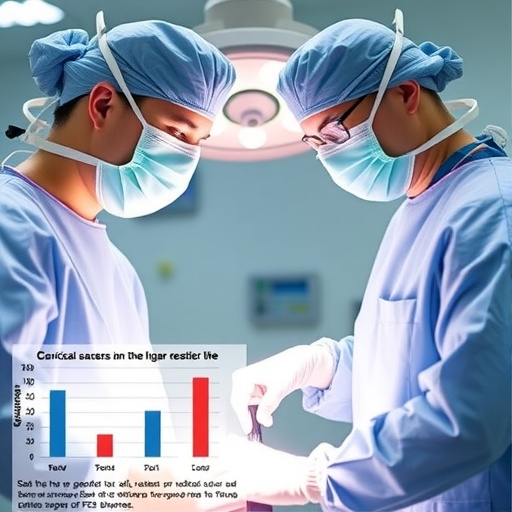In a groundbreaking multi-center cohort study published in BMC Cancer, researchers have revealed the critical influence of laparoscopic surgical proficiency on survival outcomes among cervical cancer patients undergoing laparoscopic radical hysterectomy (LRH). This large-scale investigation, encompassing 1,965 cases from four leading clinical centers in China, shines a spotlight on the intricate relationship between a surgeon’s skill and patient survival, emphasizing the need for meticulous surgical training and standardization in gynecologic oncology.
Cervical cancer remains a formidable health challenge worldwide, with radical hysterectomy established as a cornerstone intervention for early-stage disease. However, debate has persisted regarding the efficacy of laparoscopic radical hysterectomy compared to the traditional abdominal approach (ARH), particularly concerning survival outcomes. The current study delves deeply into this controversy, providing robust data that link operative proficiency directly to patient prognoses.
Central to the study’s design was the utilization of median operative time (MOT) for LRH as a proxy for surgical proficiency—a novel yet practical metric that reflects the surgeon’s experience, efficiency, and technical skill. By stratifying surgeons based on their MOTs, the investigators identified a critical threshold that delineates proficient performance, thereby offering a quantitative benchmark for surgical quality.
One of the pivotal findings of this research is that when the MOT of laparoscopic surgeons remained within 210 minutes, survival outcomes for LRH closely paralleled those of ARH, with no statistically significant difference in prognosis. This discovery counters earlier concerns regarding the oncologic safety of minimally invasive techniques, suggesting that skillful execution of LRH can achieve equivalency with open surgery.
The study employed rigorous statistical methods, including propensity score matching and mixed-effects Cox regression analyses, to adjust for confounding baseline clinical characteristics and account for random effects across different institutions. These sophisticated approaches ensure that the observed survival benefits were truly attributable to surgical proficiency rather than patient selection bias or institutional disparities.
Kaplan–Meier survival analyses further underscored the relationship between reduced operative time and improved patient prognosis, reinforcing the role of surgical efficiency as a surrogate for mastery of complex laparoscopic procedures. In essence, these results elevate MOT from a mere operational metric to a vital prognostic indicator.
This research not only highlights surgical time but also indirectly underscores the importance of comprehensive laparoscopic training and continuous skill acquisition among gynecologic oncologists. The findings prompt a paradigm shift in surgical oncology, advocating for standardized proficiency benchmarks to optimize patient outcomes in minimally invasive cancer surgery.
Moreover, the study’s multi-center nature enhances the generalizability of its findings, demonstrating that proficiency-related survival benefits are reproducible across diverse clinical environments and patient populations. Such evidence could drive the adoption of universal metrics for evaluating and credentialing surgeons performing LRH.
Crucially, this investigation dispels the notion that the laparoscopic approach inherently compromises oncologic safety. Instead, it positions surgical expertise as the decisive factor, implying that ongoing surgical education and proficiency assessments should be integral components of cancer care pathways.
This evidence-based perspective paves the way for revising clinical guidelines to incorporate surgeon-specific performance parameters, which may significantly reduce variability in outcomes and reinforce quality assurance practices in gynecologic oncology.
As the use of robotic radical hysterectomy (RRH) continues to evolve, future research may explore how technological adjuncts impact surgical proficiency and whether they can similarly reduce operative times and improve survival outcomes.
To conclude, this landmark study decisively links laparoscopic surgical proficiency, measurable through operative time, with survival outcomes in cervical cancer patients undergoing radical hysterectomy. It sets a precedent for embracing efficiency and skill as critical determinants of surgical success, offering renewed confidence in minimally invasive approaches when performed by adequately trained experts.
The implications for healthcare systems are profound, suggesting that investments in surgical training programs and establishing operative efficiency benchmarks could translate directly into enhanced patient survival. This study therefore serves as a call to action for surgeons, institutions, and policymakers alike to prioritize proficiency as a pillar of high-quality oncologic care.
This newly validated link between operative time and survival extends beyond cervical cancer, potentially influencing best practices in other oncological surgeries where minimally invasive techniques are prominent. By advancing a culture of proficiency and precision, the surgical community can better meet the dual goals of optimizing outcomes and minimizing patient morbidity.
Overall, these findings represent a significant milestone in the evolution of gynecologic cancer surgery, advocating for a skill-centered approach that harmonizes technological advances with rigorous training to maximize patient benefit.
Subject of Research: The impact of gynecologic oncologists’ laparoscopic surgical proficiency on survival outcomes in laparoscopic radical hysterectomy for cervical cancer.
Article Title: Impact of laparoscopic surgical proficiency on survival outcomes in laparoscopic radical hysterectomy for cervical cancer: a multi-center cohort study.
Article References:
Su, R., Yang, D., Chen, S. et al. Impact of laparoscopic surgical proficiency on survival outcomes in laparoscopic radical hysterectomy for cervical cancer: a multi-center cohort study. BMC Cancer (2025). https://doi.org/10.1186/s12885-025-15220-7
Image Credits: Scienmag.com




